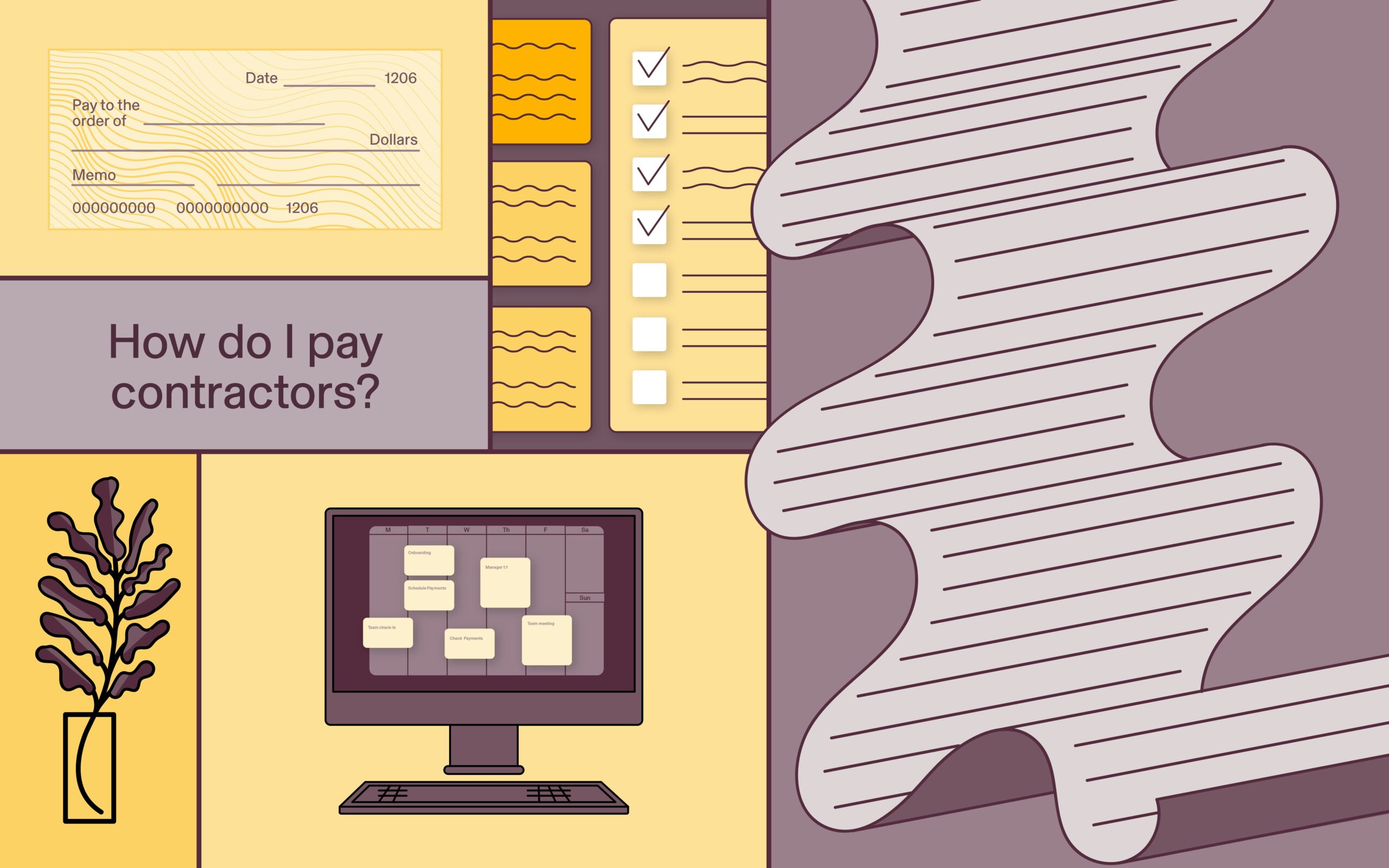How to pay independent contractors in New Zealand (NZ): [2025] Guide

About one in 20 New Zealanders are contractors, according to Stats NZ. With the rise of the gig economy, many global companies are choosing to hire skilled independent contractors in New Zealand. But before they start working, you need to determine how to pay contractors according to the country’s employment laws. What are the must-knows when it comes to having New Zealand contractors on your team?
Paying contractors in New Zealand might feel familiar if you already pay contractors in Australia, as the countries share similar labor and tax regulations. Still, you need to know the crucial differences between the two countries.
Read our step-by-step guide to learn how to comply with New Zealand’s labor laws, including how to classify, manage, and pay your New Zealand contractors.
How does New Zealand law define an independent contractor?
Under New Zealand law, an independent contractor is a self-employed individual who provides services to an individual or entity. Unlike employees, contractors are not entitled to benefits such as annual leave, sick leave, or redundancy pay. They operate with greater independence and control over how, when, and where they perform their work. Independent contractors generally perform their duties under a contract for services rather than an employment agreement or employment contract.
To determine whether a worker is an employee or an independent contractor, the classification in New Zealand has traditionally been determined by the courts. The courts apply several tests, including:
- Control test: Examines the degree of control the business has over how the work is performed. Independent contractors typically decide how to complete their tasks without direct supervision.
- Integration test: Assesses whether the worker’s role is integrated into the core operations of the business. Contractors generally perform tasks that are ancillary rather than central to the organization’s purpose.
- Fundamental test: Focuses on whether the worker operates their own business. Independent contractors usually provide their own tools, bear financial risk, and have the potential to make a profit or incur a loss.
- Intention test: Considers the intent of both parties as outlined in the contract. A clear agreement specifying the nature of the relationship supports the classification as a contractor.
However, recent legislative developments aim to introduce a 'gateway test' with specific criteria for determining worker status, which could reduce reliance on court-applied tests in the future.
Contractor vs. employee
The key difference between contractors and employees in New Zealand lies in the nature of their working relationship. Employees work under an employment agreement and are entitled to benefits like paid leave, minimum wage, and protections under the Employment Relations Act 2000. They are closely integrated into the business and work under its direction.
In contrast, contractors operate independently and are responsible for their own taxes, insurance, and tools. They are usually engaged for specific projects or tasks and have the flexibility to work with multiple clients.
Use cases for hiring:
- Employees: Ideal for ongoing roles that require consistent oversight and long-term commitment. Examples include administrative staff, sales representatives, and customer service agents.
- Contractors: Suitable for short-term projects, specialized tasks, or roles requiring flexibility. Examples include freelance graphic designers, consultants, and IT specialists.
Benefits of hiring independent contractors in New Zealand
Engaging independent contractors can offer several advantages for businesses in New Zealand. Here are some of the key benefits:
Flexibility in workforce management
Independent contractors allow businesses to scale their workforce up or down based on project needs. This flexibility is particularly valuable for industries with seasonal demands or fluctuating workloads.
Access to specialized skills
Contractors often bring niche expertise and skills that may not be available in-house. This makes them ideal for short-term projects requiring specific knowledge, such as IT development or creative design.
Lower risk of long-term obligations
Since contractors are not entitled to benefits like annual leave, sick leave, or redundancy pay, businesses can reduce their long-term financial commitments. This can result in significant cost savings for project-based work.
Faster onboarding and deployment
Hiring contractors typically involves less administrative work compared to onboarding employees. They can often start work immediately, which helps businesses meet tight deadlines and maintain productivity during busy periods.
Cost efficiency
While contractors may charge higher hourly rates, businesses save on overhead costs such as office space, equipment, and employee benefits. This makes hiring contractors a cost-effective solution for temporary or specialized tasks.
Contractor tax in New Zealand
Independent contractors in New Zealand are responsible for managing their own tax obligations, which differ significantly from those of employees. Understanding these differences is essential for both contractors and businesses engaging their services.
Tax obligations for contractors
Contractors must register with Inland Revenue (IR) and file their own tax returns. They are responsible for:
- Income tax: Contractors are required to pay income tax on their earnings through provisional tax payments.
- Goods and Services Tax (GST): If earning more than NZD 60,000 annually, contractors must register for GST and charge it on their services.
Withholding tax (schedular payments)
In some cases, businesses may be required to deduct withholding tax from payments made to contractors. This typically applies to contractors who do not provide an IRD number or are engaged in specific industries listed by Inland Revenue. The withholding tax rate varies depending on the contractor’s circumstances and is deducted from their gross earnings. Contractors can claim this as a credit when filing their tax returns.
Tax compliance for businesses
Businesses engaging independent contractors should:
- Request invoices: Contractors should issue invoices for their services, including GST if applicable.
- Maintain records: Keep detailed records of all payments made to contractors for tax and audit purposes.
- Confirm GST registration: Verify whether the contractor is registered for GST and account for it accordingly.
Complying with contractor tax in NZ ensures a smooth working relationship with contractors.
Penalties for contractor misclassification in New Zealand
Misclassifying a worker as an independent contractor when they should be classified as an employee is a serious violation under New Zealand law. Misclassification can occur when businesses fail to assess employment status using the established legal tests or when they intentionally categorize employees as contractors to avoid providing entitlements.
Consequences of misclassification
Employers found guilty of misclassification may face significant penalties, including:
- Fines: Regulatory authorities can impose fines for non-compliance with employment laws.
- Back pay: Employers may be required to compensate workers for unpaid wages, holiday pay, and other entitlements.
- Additional liabilities: Businesses may also need to pay for unpaid KiwiSaver contributions, ACC levies, and other employee benefits.
Key compliance considerations
To avoid misclassification penalties, businesses should:
- Conduct thorough evaluations: Use the control, integration, fundamental, and intention tests to classify workers accurately.
- Document agreements clearly: Ensure contracts specify the nature of the relationship and align with the worker’s actual role and responsibilities.
- Seek legal advice: Consult with employment law experts when in doubt about a worker’s classification.
By taking these precautions, businesses can mitigate risks and ensure compliance with New Zealand self-employed contractor rights.
How to pay independent contractors in NZ: 4 steps
Navigating how to pay independent contractors in New Zealand requires understanding local laws and choosing efficient tools. Here's a streamlined four-step guide to ensure you're on track:
Step 1. Classify your workers in New Zealand: Contractor vs. employee
There are significant legal differences between independent contractors and employees, which impact the rights and obligations of the employer and the worker. Understanding the classification of contractor vs. employee in NZ is crucial to compliance with labor laws.
Misclassifying workers in New Zealand can lead to significant penalties and legal repercussions for employers, including back payments for taxes, holiday pay, and other employment-related entitlements. The misclassified worker could file a complaint or claim with the Employment Relations Authority (ERA) for not receiving the benefits and protections they’re entitled to as part of the employment relationship.
To help employers determine a worker’s classification, the New Zealand courts developed four legal tests: the intention test, the control vs. independence test, the integration test, and the fundamental/economic test. One single test won’t give you the right answer; you need to consider all the points that apply to your situation to help you decide how to classify your workers.
The table below gives an overview of the differences between independent contractors— who can also work as sole traders or be small business owners—and employees.
Contractors
Employees
High level of worker autonomy. Contractors generally enjoy more freedom to decide how and when to complete their tasks.
More guidance from the employer. Employees generally get more guidance from their employer on how and when to do their work.
Workers use their own tools and equipment.
Employees are typically provided with equipment and tools by the employer.
Less integrated into the organization. Contractors tend to be less integrated into the employer’s company, usually working remotely and independently.
Closely integrated. Employees are more integrated into the company and often work with their team at the office.
No entitlement to company benefits. Contractors are typically responsible for paying their own taxes and don’t receive benefits like minimum wage, overtime pay, vacation pay, public holidays, health insurance, retirement plans, or paid sick leave.
Entitled to company benefits. Employees are entitled to company benefits and protections, including bereavement leave and parental leave, and they don’t have to worry about settling payroll tax and social security contributions on their own.
Defined-period contracts. Contractors are usually engaged for a specific project or a defined period of time.
Indefinite contracts. Employees are typically hired on indefinite contracts, with guaranteed severance pay upon termination.
More risk. Contractors typically assume more risk and liability for their work.
Protection from work-related liabilities. Employees face no risk of loss and are generally protected from liability for work-related issues.
Subcontracting is allowed. Contractors have the option to subcontract some of their work to another person or business.
No subcontracting. Employees are expected to perform their own tasks and cannot delegate responsibilities without company approval.
Step 2. Choose the best payment method for New Zealand independent contractors
Before you enter into a contracting arrangement with a New Zealand contractor, you need to figure out how you’ll pay them. In the era of remote work, there are more options than ever available:
- Wire transfer: Also known as bank wires, bank transfers, or credit transfers, this option is a traditional and secure method of transferring funds to your contractor’s bank account in New Zealand. However, international bank wires may involve higher fees and longer processing times.
- International money orders: You can send a money order online through a company like Western Union, and the independent contractor can deposit it into their bank account. While this option is secure and traceable, it’s not the most convenient or cost-effective method since the process can be slow and come with fees and exchange rates.
- Online payment providers: Payment platforms like PayPal, Wise, and Stripe are popular choices for international payments that offer fast transfers and lower fees compared to traditional bank transfers. But, you still have to account for fluctuating exchange rates and some extra fees.
- Global payroll services: Using a global payroll service streamlines the payment process and makes it easy to comply with New Zealand’s labor and tax regulations. With a platform like Rippling, you can pay your New Zealand contractors alongside the rest of your global workforce.
Step 3. Process payments for New Zealand contractors using payroll software
Among the different options for paying New Zealand contractors, using a global payroll service is the simplest and most efficient way to go.
With Rippling, you can quickly pay international contractors around the world without waiting on currency conversions.

Step 4. Ensure tax compliance for New Zealand contractor payments
Whether or not you need to deduct income taxes from New Zealand contractors’ pay depends on the contracting arrangement.
Suppose you hire workers on a contract-for-service basis and send them schedular payments. In that case, you need to deduct taxes from their earnings—unless they have a certificate of exemption and aren’t being paid under a labor hire arrangement by a labor hire business, or they have a 0% special tax rate certificate. You don’t need to make any other deductions, as contractors are responsible for taking care of their KiwiSaver and student loan deductions.
Contractors receiving schedular payments have to fill out an IR330C form (a tax rate notification for contractors). This tells you what income tax rate to deduct from their schedular payments. If they don’t give you an IR330C, you need to deduct tax at either the 45% non-notified rate or 20% if the contractor is a non-resident of New Zealand.
If you hire independent contractors and don’t send them schedular payments, then you don’t need to deduct taxes from their earnings. When filing their own taxes in New Zealand, contractors usually need:
- An IRD number (a unique number issued by Inland Revenue Department)
- Goods and services tax (GST) registration if they earn more than NZ $60,000 a year
- Withholding tax registration
Some employers have written independent contractor agreements stating they will treat their payments as schedular payments and deduct tax on their behalf. In this case, you’d need to register as an employer and treat the contractors as workers receiving schedular payments. These contractors would also have to fill out an IR330C form.
No matter the contracting arrangement, you need to keep records of the person or company and how much you pay them, according to Inland Revenue. These records need to be kept in New Zealand for seven years and include:
- Wagebook information
- Completed IR330 and IR330C forms
- Letters from the Inland Revenue Department asking you to change your employee’s tax code or rate
Effortlessly manage contractors around the world with Rippling
Expanding your global workforce has never been easier. Rippling’s global hiring solutions include features like:
- Employer of Record services: Rippling EOR services handles compliance, taxes, and local employment laws when hiring full-time employees abroad.
- Global Payroll: Manage international contractor payments alongside employee payroll in one unified Global Payroll system.
- Localized expertise: Rippling ensures compliance with local laws, making it easier for businesses to navigate the complexities of international hiring.
With Rippling, businesses can focus on growth while ensuring a compliant and efficient workforce management process worldwide.
FAQs about paying independent contractors in NZ
Do you need to withhold taxes when paying contractors in New Zealand?
Yes, you do need to deduct taxes from contractors receiving schedular payments. Some exceptions exist, including if the contractor has a certificate of exemption or a 0% special tax rate certificate. If you don’t send schedular payments to contractors, then you likely don’t have to withhold any taxes.
Does the New Zealand minimum wage apply to independent contractors in New Zealand?
No, the New Zealand minimum hourly rate does not apply to independent contractors. Employment rights and minimum wage laws are specifically for employees, and independent contractors typically negotiate their rates and terms with the business hiring them.
Do New Zealand contractors get benefits?
No, independent contractors aren’t covered by most employment-related laws, meaning they aren’t entitled to benefits like annual leave, public holidays, and paid sick leave. While independent contractor rights in NZ differ from employee entitlements, contractors are protected under general civil law. For example, everyone in New Zealand—including contractors—is protected by the Accident Compensation Corporation (ACC), and contractors can choose between ACC’s standard CoverPlus or CoverPlus Extra.
ACC gets a summary of contractors’ earnings from their income tax return and combines that information with the contractor’s Classification Unit (CU) to calculate the contractor’s ACC levies.
Can you pay contractors in New Zealand in your home currency?
It's best to pay New Zealand contractors in their home currency, the New Zealand dollar. However, you may be able to pay contractors in your currency if they agree to it in writing.
Many international payment providers, like Rippling, support contractor payments in either New Zealand dollars or your currency.
Can you manually pay contractors in New Zealand?
Yes, you can manually pay contractors in New Zealand using payment methods such as wire transfers, online payment platforms, or even cash. But manual payments often involve extra admin work and are less efficient compared to global payroll software.
Manually processing payments also comes with some big risks:
- Compliance: Manual payment processes come with the risk of human error and inaccuracies, which can lead to compliance issues with the New Zealand government.
- Security: If you don’t handle contractor records in a secure, confidential manner, sensitive information can easily be lost, stolen, or misused.
- Contractor experience. Manually paying contractors can be inefficient, often lacking transparency about what exactly they're being paid for and when they'll get paid.
By automating your payroll, you can reduce manual work, avoid headaches, and pay your contractors quickly and compliantly.
How do you turn a contractor into an employee in New Zealand?
Converting a contractor into a full-time employee involves a change in the working relationship and new legal obligations. To adhere to New Zealand employment laws, you’ll need to create an employment agreement and make all the necessary deductions. These include pay-as-you-earn (PAYE), student loan support, child support, KiwiSaver, and the employer’s superannuation contribution tax (ESCT).
If you don't already have one, you'll need to establish your own entity or use an employer of record (EOR) to hire employees in New Zealand.
You’ll also need to keep accurate employee records for wages, time, holidays, and leave in compliance with the Employment Relations Act 2000 and the Holidays Act 2003.
This blog is based on information available to Rippling as of December 24, 2024.
Rippling and its affiliates do not provide tax, legal, or accounting advice. This material has been prepared for informational purposes only, and is not intended to provide, and should not be relied on for, tax, accounting, or legal advice. You should consult your own tax, legal, and accounting advisors before engaging in any related activities or transactions.









